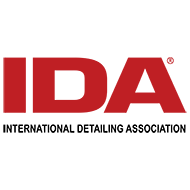- What is “detailing”?
- What does a detailing service include?
- How much does a detailing service cost?
- How often should I have my car detailed?
- What types of detailing businesses are there?
- How can I choose the right detailing professional for me?
- Why should I get my car professionally detailed?
Detailing involves a thorough cleaning and conditioning of both the interior and exterior of your vehicle, generally consisting of a more in-depth service than a standard wash and vacuum. This service may also include providing protective coatings for those same interior and exterior surfaces. It is a meticulous step-by-step process to maintain your vehicle’s beauty and protect your investment. Detailing services can extend beyond automobiles and could include trucks, buses, SUVs, RVs, boats, motorcycles, or even airplanes. Many detailing companies are able to handle some, or all, of these types of vehicles.
There is no set guideline as to what services are included in a business’s detailing menu. Many businesses have different options that cover basic or express services, such as a wash and wax or an interior cleaning, while other packages can go more in-depth and involve paint correction by machine polishing, interior stain removal, and more.
Detailing packages vary in terms of services performed, cost, and results. Contributing factors to these variations include but are not limited to: level of expertise, quality of service, quality of the products used in that service, age/condition of the vehicle, and equipment and tools used to perform those services.
Whether you have just purchased a new vehicle that needs to be protected, are returning a leased car, are preparing a car for sale (and you want to get maximum resale value), need your family car’s interior thoroughly sanitized, or desire perfect candy gloss on your show car, a professional auto detailing service can take your vehicle from ordinary to extraordinary. It is best to talk to your detailer about your needs so they can recommend the service that is right for you.
Not only does pricing vary from region to region, detailing prices also vary from business type to business type. High-volume businesses generally charge less for their services, while mobile detailers and boutique shops operate at a higher cost. Again, this is the general trend, so we recommend contacting your local detailers to find out more about the specific services and pricing they offer.
Once a vehicle is detailed, driving conditions and maintenance will determine how often the vehicle will need to be cleaned. To prevent contamination and soils from building up and bonding to the vehicle, many professionals recommend that a vehicle is washed and vacuumed at least once every two weeks.
A vehicle’s paint should be protected with wax, sealant, or coating at all times. These products can last anywhere from a few weeks to many years. Always ask your detailer how long their protective product lasts and when it should be re-applied.
Paint correction or machine polishing a vehicle’s paint should only be done as needed. The paint correction process removes a small amount of the total thickness of a vehicle’s paint system, and if polished too many times, eventually the paint system will become too thin and frail.
For the interior, carpets and upholstery should be vacuumed regularly. Spills, large pieces of debris, and pet fur should be cleaned as soon as possible to prevent embedding in fibers, staining, or lingering odors. Upholstery and carpet shampoo should be used as needed for spills, soils, or anytime vacuuming will not remove the soil.
In most cases, modern automotive leather is color-dyed and coated. Coated leather should be cleaned at a minimum of every three to four months. While protectant is recommended, conditioning is not a requirement for coated leather.
Just like there are many different types of automobiles on the road, there are many different types of detailing businesses that serve them. While not every single shop fits directly into one of these categories, we compiled some of the common ones to help determine which may be best for you.
As with many service-based industries, price and quality of detailing can vary by region. Generally, on the lower end of the price spectrum, you will find high-volume facilities, such as large car washes, franchises, or dealerships. These businesses focus on fast, convenient, and cost-efficient services. These facilities generally rely on automated equipment or a team of employees and can be good for quick clean-ups and maintenance on older or daily-driven vehicles. Employees are usually hired with minimal experience and quickly trained to perform basic detailing services, such as wiping down the exterior and interior, cleaning and dressing tires, and cleaning the windows. With the industry continuing to grow, however, many high-volume shops are investing in more training in order to produce more advanced work, such as paint correction and ceramic coatings.
Another popular type of detailing business is mobile detailing. A mobile detailer travels to the customer’s location and can perform all different levels of service. Some mobile detailers bring their own utilities (water tanks and generators for electricity), while others may request to use yours. Many mobile detailers use waterless or rinseless wash products, which allow them to safely wash the vehicle using under a few gallons of water. Some mobile detailers only offer basic services (i.e., hand wash, drying, and tire dressing), while others may offer very advanced services (i.e., paint correction and coating) but may require the customer to have a garage or carport to work in to control climate and lighting. Mobile service is usually focused on providing convenience to the customer, but that convenience may sometimes come with a fee.
The other popular type of business is the high-end, boutique-style shop. These are usually privately owned small businesses that produce very high quality but low volume work. Many times, the business owner is the technician or there is a very small staff of well-trained employees. Shops like this usually offer very advanced services (such as paint corrections, ceramic coatings, or specialties like paint protection film or window tinting) but usually come with a higher price tag. While most of these businesses are welcoming to any type of vehicle, you are more likely to see higher-end vehicles being serviced here. Customers who are very particular about their vehicle’s appearance and finish should look for boutique-style businesses.
Regardless of which style of business you may choose, you should always do your research on all available options.
When choosing the best detailer for you and your vehicle, you should look for:
- Credentials: Is the detailer an IDA member or IDA Certified Detailer? Do they have other certifications or accreditations from chemical or equipment manufacturers?
- Customer Reviews: Technology today can help customers quickly learn a business’s reputation before they even pick up the phone to schedule an appointment. Look through reviews on Google, Facebook, and Yelp. More importantly, see how the business responds to negative reviews. Are they professional about it? Do they try to win over an unsatisfied customer?
- Website/Social Media: A quick visit online can give you access to what the shop, staff, previous detailing projects, and customers may look like, and how they conduct business.
- Answering Questions: Is the manager or technician you are speaking with able to answer your questions or explain the process to you in ways you are able to understand? Are they listening to your concerns and offering solutions to them or are they trying to sell you things you don’t need?
Our members get asked this question frequently, so let’s check out what a few of them have to
say…
“You should use a professional level detailing service to safely preserve the vehicle’s surfaces
and retain the value, just like you bring your vehicle to a certified mechanic so you can prolong and maintain the working condition.”
– Seth Gaines, CD-SV, Coastal Shine Auto Detailing, IDA Operator Member
“A new car will lose approximately 20% of its value on average in the first year and 15% every year after that until it’s about 10 years old when it’s only worth about 10% of the original price. Of course, vehicles lose value at different rates, but professional detailers are masters at slowing down this rate of decrease or even restoring/protecting the value of your vehicle.”
– Matt Jackson, CD-SV, Biff’s Automotive Detailing, IDA Operator Member
“Because you want to protect your investment with high quality chemicals and from someone who knows how to properly care for each and every surface inch of your vehicle.”
– Annemarie Norman, Immaculate Detailing, IDA Operator Member
“It’s the same reason we go to the dentist. Sure you can brush, floss, etc., but you still need a professional to inspect for any potential issues and for that true deep cleaning.”
– Mario Valdes, Winter Park Auto Spa, IDA Operator Member
IDA Certified Detailers
What is an IDA Certified Detailer?
A Certified Detailer (CD) is a detailing industry professional who has passed at least the first level of IDA Certification. CDs must partake in continuing education and recertify every two years, so you can rest assured that your vehicle is being taken care of by a professional that is up to date on the latest tools, techniques, and best practices.
What can I expect from an IDA Certified Detailer?
CDs have demonstrated their knowledge and determination through the successful completion of written exams (and, in the case of Skills Validated detailers, hands-on assessments), so you can be confident that your vehicle is in good hands.
How can I find an IDA Certified Detailer?
Use our online directory to find a CD in your area. You can search specifically for Certified Detailers, Skills Validated detailers, or Recognized Independent Trainers. Only detailers who appear in our directory hold a current IDA certification.
Do IDA Certified Detailers specialize in certain services?
The IDA currently offers several specialty certifications for detailing professionals.
Those who achieve the status of IDA Certified Detailer – Watercraft Certified (CD, WC) have demonstrated expertise not only as an auto detailer, but also in the dedicated area of watercraft detailing. Watercraft Certified Detailers have exhibited the specific knowledge needed to properly care for various vessels in multiple marine environments, and they understand the intricacies that distinguish marine detailing from other forms of detailing.
Those who achieve the status of IDA Certified Detailer – Motorcycle Certified (CD, MC) have demonstrated expertise not only as an auto detailer, but also in the dedicated area of motorcycle detailing. Motorcycle Certified Detailers have exhibited the specific knowledge needed to properly care for various types and styles of motorcycles, and they understand the intricacies that distinguish motorcycle detailing from other forms of detailing.
Those who achieve the status of IDA Certified Detailer – RV Certified (CD, RVC) have demonstrated expertise not only as an auto detailer, but also in the dedicated area of Recreational Vehicle (RV) exterior detailing. RV Certified Detailers have exhibited the specific knowledge needed to properly care for various types and styles of Recreational Vehicles, and they understand the intricacies that distinguish RV exterior detailing from other forms of detailing.
How can I learn more about the detailing process?
We have a growing series of consumer care articles to help you better understand the detailing process. If you have additional questions, please feel free to contact us.


